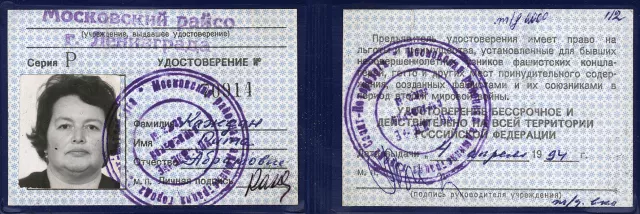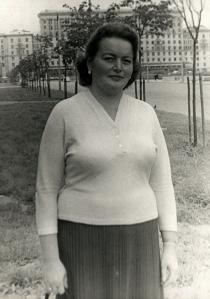Rita Kazhdan's ghetto certificate
This is a certificate confirming that I was a prisoner in the Minsk ghetto from July 1941 until September 1943. I received it in 1994.
On 22nd June 1941 the Great Patriotic War broke out. On 28th June the Germans marched through the city without a single shot. On 25th July we were herded into a ghetto. They sealed the territory off with wire. There we settled together with the family of mum's friend. Father got fixed up as an electrician in the printing house where Mayer, the husband of my mum's sister, worked and maintained the family. My father, a very respectable person, was elected a house senior man, and he was to carry our lodger's lists to the Judenrat. It was 31st August 1941. My father wasn't back by the evening. It turned out that when he was going to take the documents to the Judenrat mum asked him to drop in on her sister Fanya, who lived in the next street. But there was a raid there. Everybody was captured [by the Gestapo]. As we learnt later from a friend, they were urged along the street, forced to raise hands and sing songs. They were herded into the prison where dad had already served a term earlier, and there they were shot.
The three of us remained with my mother. After the massacre our street became a Russian district and we were resettled. Mum went to work at the Judenrat as an accountant. The authorities ordered the handing over of all furs, fur collars, fur coats - everything expensive that people had - to the storehouse in the Judenrat so that the Germans could choose everything they needed for their army, for their wives and for themselves. In brief, we suffered from deprivation and hunger.
On 2nd March 1942 another pogrom took place. The massacre lasted for three or four days, I don't remember now. We were hiding in a room separated from the next room with literally a plywood wall. Each word in the next room was audible. In the room we herded together 12 to 15 of us. When the massacre was over, we were found in this room. But, luckily, the mobile gas chambers and the policemen who guarded Jews were already gone, so we were simply kicked out.
Abram Aronovich Levin, the husband of mum's friend - a wonderful man, very decent, in advanced years - was a pharmacist. We moved to his place. In this drugstore there was a so-called malina, a place where one could hide from the fascists. Abram Aronovich himself stayed in the drugstore as the manager, and we edged ourselves into the pharmaceutical cupboard in the next room, where drugs and measuring glasses were kept, through the lower shelf, which could be pulled out; then Levin put the shelf back. This is how we concealed ourselves.
We were told the massacre was over and it was possible to come out, but Abram Aronovich nevertheless made sure that we didn't leave. But mum came out and Abram's wife asked her to go home and pick up certain things. As mum was a working person, she had special documents with her. Everybody knew the Germans were catching (and shooting) only unemployed people. We never saw mum again. Then we were informed that she had been taken away with other Jews, and there was a baby in her arms. Mum had a perfect command of German, but apparently there were not only Germans but policemen as well - the traitors, who served for the Germans - so she didn't manage to leave the column. So my brother and I were left without any means of subsistence.
I was like a skeleton covered with skin. But I always had a ruddy and round face. So they didn't pay special attention to me. That's why I could walk away from the crowd that convoyed to work and beg in the streets and in the Russian district. And from time to time I succeeded in taking something into the ghetto for my brother. Once as I was walking out of the ghetto, I came across my classmate who helped get me fixed up in the plant where one could do hard unskilled work. 75 Russian Jews were working at the plant. They were roofers, cleaners, carpenters, and laundrymen. Before the war it had been the machine-tool plant and during the occupation German tanks were repaired here. I was a pin-up, very beautiful girl, especially as I did not have a pronounced Jewish appearance, with long light brown braids; by and large, they accepted me for employment. I got a ladle of soup every day. It was nearly a liter, with rotten meat, and a small slice of bread. I ate some of it and the rest I carried to the ghetto for my brother. Nearly all the people in the ghetto were annihilated.










